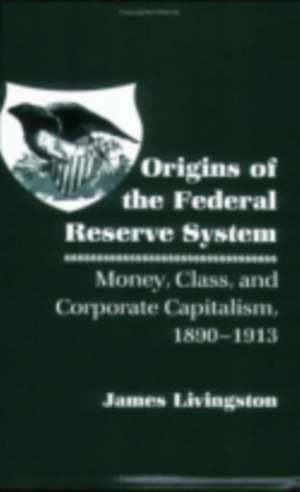Origins of the Federal Reserve System – Money, Class, and Corporate Capitalism, 1890–1913
Autor James Livingstonen Limba Engleză Hardback – 20 apr 1986
The book seeks to uncover the roots of the Federal Reserve System and to explain the awakening and articulation of class consciousness among America's urban elite, two phenomena that its author sees as inseparable. According to Livingston, the movement for banking and monetary reform that led to the creation of the Federal Reserve System played an important role in the general transition from entrepreneurial to corporate capitalism: it was during this struggle for reform that a group of business leaders first emerged as a new corporate social class.
This interdisciplinary account of the social, cultural, and intellectual Origins of the Federal Reserve System offers both a discussion of the sources of modern public policy and a persuasive study of upper-class formation in the United States. The book will interest a wide audience of historians, economists, political scientists, sociologists, and others who wish to understand the rise of America's corporate elite, the class that has played a large-if not dominant-role in 20thcentury America.
| Toate formatele și edițiile | Preț | Express |
|---|---|---|
| Paperback (1) | 337.19 lei 6-8 săpt. | |
| MB – Cornell University Press – 6 noi 1989 | 337.19 lei 6-8 săpt. | |
| Hardback (1) | 448.39 lei 6-8 săpt. | |
| MB – Cornell University Press – 20 apr 1986 | 448.39 lei 6-8 săpt. |
Preț: 448.39 lei
Nou
Puncte Express: 673
Preț estimativ în valută:
85.81€ • 89.08$ • 71.55£
85.81€ • 89.08$ • 71.55£
Carte tipărită la comandă
Livrare economică 22 martie-05 aprilie
Preluare comenzi: 021 569.72.76
Specificații
ISBN-13: 9780801418440
ISBN-10: 0801418445
Pagini: 250
Dimensiuni: 155 x 235 x 21 mm
Greutate: 0.54 kg
Editura: MB – Cornell University Press
ISBN-10: 0801418445
Pagini: 250
Dimensiuni: 155 x 235 x 21 mm
Greutate: 0.54 kg
Editura: MB – Cornell University Press
Descriere
In Origins of the Federal Reserve System, James Livingston approaches this controversial topic from a fresh perspective, asking how, during this era, a "new order of corporation men" made itself the preeminent source of knowledge on all significant economic issues and thereby changed the character of public and political discourse in the United States.
